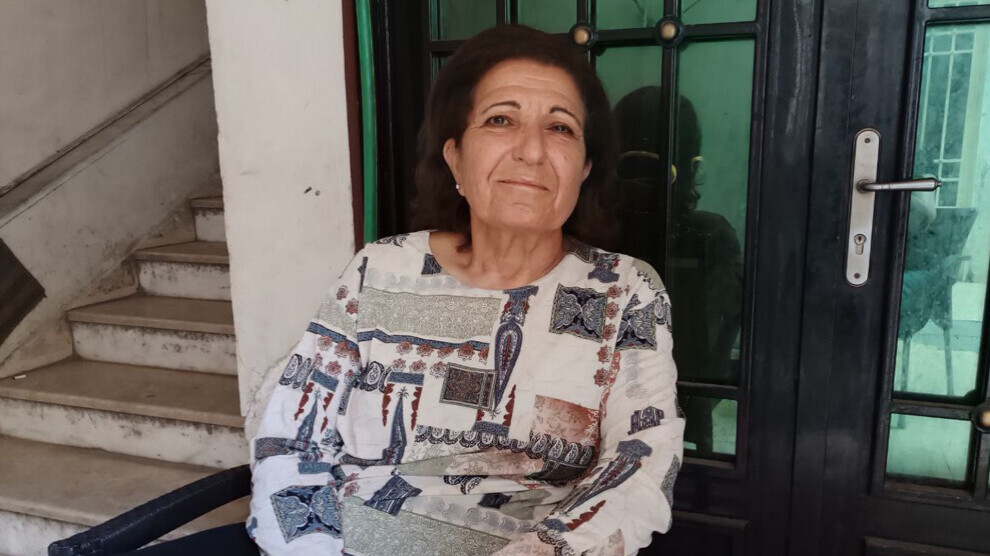Basima Al-Akabani: HTS fuels Syria’s civil war
Political activist Basima Al-Akabani said Syria is already in a state of civil war, stressing that “some say we may be heading toward civil war, but I believe we are already experiencing it.”

ROCHELLE JUNİOR
Sweida – Syria has endured years of violence and human rights abuses, but recent months have brought a dangerous escalation since Hayat Tahrir al-Sham (HTS) and its fighters took control of Damascus. The group’s grip on power has intensified repression in many cities outside its influence.
In an interview with our agency, political activist Basima Al-Akabani described the situation as crimes that “cannot be reduced to the word ‘violations,’” holding HTS directly responsible for fueling the conflict and dragging the country into further chaos.
Escalating abuses
Asked about the abuses taking place, Al-Akabani said “Syrians had long suffered under the former regime—arbitrary detention, disappearances, torture, and discrimination—but the uprising once carried hopes of building a state based on equal citizenship. Unfortunately, that hope was hijacked by an extremist faction that rejects freedom and dignity. What we face today are not mere violations but heinous crimes that surpass description.”
She underscored the importance of documentation: “This is not a secondary task; it is essential. Documentation amplifies victims’ voices, ensures credibility, and seeks justice at the international level. Even perpetrators record their own crimes, and these recordings eventually serve as evidence.”
Media manipulation and isolation
Al-Akabani accused HTS of deploying systematic disinformation to conceal abuses. “Sometimes they outright deny facts as if nothing happened, but truth cannot be hidden for long. Videos and photos reinforce the credibility of the real narrative,” she said.
She also highlighted the critical role of independent reporting: “If an international fact-finding committee were established, this evidence would provide an accurate account of events, and the role of the press cannot be overlooked. International reports on coastal violations were crucial, often preceding and confirming the UN report, clearly documenting the facts and shedding light on the situation in Syria.”
But in Sweida, al-Akabani described the situation as catastrophic: killings, forced displacement, burning of homes, destruction of wells, and widespread power and water cuts. “Today we are almost cut off from the internet, as if the intention is to isolate the city completely. This isolation is terrifying. We fear it could pave the way for mass atrocities,” she warned.
‘We are already in civil war’
Rejecting claims that Syria is only approaching civil war, al-Akabani insisted:
“We are already in it. Targeted killings, roadside attacks, abductions, fabricated accusations, detentions at the only available crossing, kidnappings of civilians—what do we call this if not civil war?”
She added that civilians remain missing, vehicles and passengers are detained, and entire cities are under siege without food, medicine, or fuel.
Al-Akabani held HTS directly responsible, citing its so-called “Victory Conference” led by Ahmad al-Sharaa (known as al-Jolani), where the group dissolved rival factions and consolidated power. “HTS has seized control of leadership positions and state institutions. It rules through sheikhs and emirs, dragging the country back 1,400 years,” she said.
Solidarity and resistance
Al-Akabani stressed the need for solidarity across Syria’s communities, while acknowledging the limited practical means of uniting against HTS. “There is emotional solidarity and empathy, not only among minorities but across all groups. Yet there is no unified political front capable of negotiating under this repression—unless external pressure forces HTS to reconsider,” she said.
She added that HTS attempts to divide communities by labeling certain groups as “militias,” but such tactics have only strengthened social solidarity in response.
Role of women and youth
Al-Akabani highlighted the vital role of women in mitigating the impact of conflict.
“Women try to ease the suffering caused by war through compassion and humanitarian work. They prepare meals for shelters, volunteer with the Red Crescent, and provide aid in all fields. This contribution is indispensable,” she said.
“In decision-making and governance, women’s influence remains very limited—not only in our region but across Syria. During crises, their political participation diminishes further, yet they continue to play a vital and active role in humanitarian and relief efforts,” she said.
She also warned of the devastating impact on children. “Children are the greatest victims. It pains me to see them playing ‘war’ and ‘execution’ in the streets, repeating insults like ‘pigs’ that we never heard before. These games and words are shaping a violent environment that will scar future generations.”
